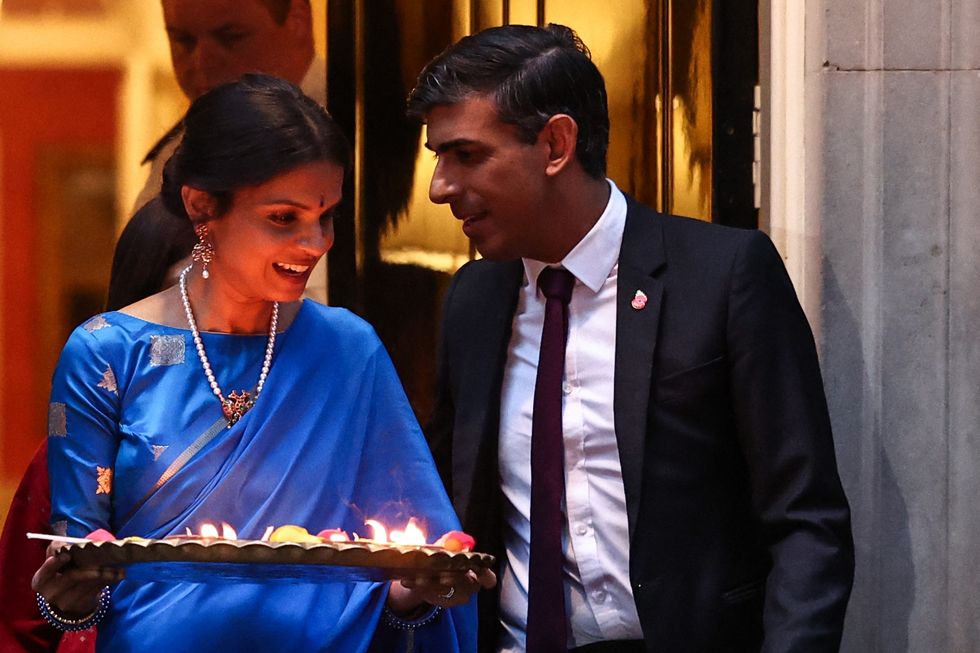During the Covid inquiry, it was revealed that in a meeting held in July 2021, Rishi Sunak advocated fervently for the lifting of all lockdown restrictions.
Boris Johnson, during the same meeting, reportedly referred to individuals as "malingering" and "workshy," as detailed in a diary entry by the then chief scientific adviser, Sir Patrick Vallance, The Guardian reported.
At this gathering, tensions arose between the then chancellor and prime minister, advocating for loosening restrictions, and the "more cautious" stance taken by Michael Gove and Sajid Javid. This meeting occurred amid a rise in Covid-19 cases and hospital admissions.
According to Sir Patrick Vallance's diary entry, the then prime minister appeared disheartened and spoke of bleak predictions.
“PM looks downbeat and talks of grim predictions,” the entry read. “[Javid] says ‘we are going to have to learn to live with it’, ‘and die with it’, PM says.”
During his testimony at the inquiry, Javid, who served as the health secretary from June 2021 to July 2022, acknowledged that it was "possible" Johnson had uttered the words attributed to him.
In discussions about these meetings, it was noted that the prime minister's statements often blurred the line between his actual thoughts and jest, even in crucial discussions.
The recorded entry also highlighted Sunak's persistent advocacy for a swift and complete removal of restrictions, emphasising a belief in the efficacy of vaccines.
Additionally, it mentioned a counterpoint, suggesting that the absence of vaccines might have led to a lockdown at that point.
The entry further depicted Johnson's alleged desire for a comprehensive return to work, expressing frustration at the perceived need for consultations with employees and trade unions. The entry quoted him referring to individuals as "malingering" and "workshy" in relation to returning to work.
In Vallance's recorded entry, the meeting was described as "political posturing," expressing concern among civil service officials. Both Vallance and England's chief medical officer, Sir Chris Whitty, reportedly highlighted the risks extensively during the session.
A claim made by Javid suggesting that Johnson was not effectively leading the government during the pandemic, indicating his chief adviser, Dominic Cummings was “prime minister in all but name” was refuted during Dominic Raab's testimony at the inquiry.
He dismissed the notion of a puppet regime, denying the characterisation of Cummings effectively running the government. Raab defended Cummings, suggesting his role was to provide impetus and create challenges within the decision-making process.
Raab, who resigned amid allegations of bullying behaviour towards civil servants, emphasised Cummings' role as someone who aimed to catalyse the government's direction and introduce challenges, likening it to "some grit in the oyster," during his testimony at the inquiry.
Raab criticised Andrew O’Connor KC, counsel for the inquiry, accusing him of being "dismissive." This came after O’Connor suggested that Raab was using "management speak" while discussing his theory of adopting a "perpetual beta" approach to crisis decision-making.
“In any crisis it’s not going to be a manicured response and there will certainly be people who feel bruised by the pressure. Sometimes that will be because someone has behaved inappropriately. I get it,” Raab said, acknowledging a broader issue concerning delivery within Whitehall.
He defended his decisions to embark on several government trips and a family skiing holiday amid the looming pandemic and the initial appearance of cases in Britain.
He insisted that such breaks were infrequent due to the demanding nature of his role, emphasising his constant connectivity and involvement in communication chains regardless of his physical location.
The former minister recounted an instance in April 2020 when he received "five minutes’ notice" of his appointment to deputize for the prime minister, who had been hospitalised with the virus.
He described the planning preceding this event as "pretty sparse." When initially appointed as deputy prime minister by Johnson, Raab mentioned that Johnson had conveyed, "You’ve got my back."
Raab explained that one of his initial actions was to assemble the team and organise a cabinet meeting, emphasising his awareness of the gravity of the moment.
He said, “I didn’t want anyone saying that Dom Raab’s enjoying this a bit too much, because I wasn’t, and I was there to do a job.”
















 Rishi Sunak and Akshata Murty. (Photo by HENRY NICHOLLS/AFP via Getty Images)
Rishi Sunak and Akshata Murty. (Photo by HENRY NICHOLLS/AFP via Getty Images) 

